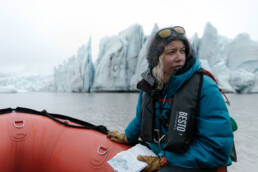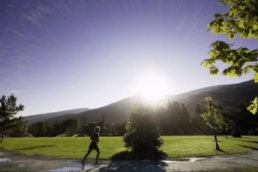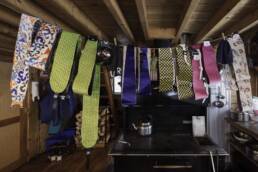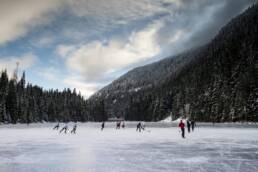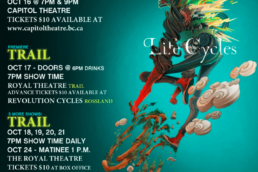Take a virtual-reality trip to the glaciers of Iceland, the remote fishing villages of Indonesia and more on November 30 in Nelson, British Columbia.
On November 30, Nelson, British Columbia, will be the site of a next-level experience that combines National Geographic Explorers, virtual reality, and the award-winning talents of the Sherpas Cinema. The special viewing will take place between 7-10pm at the new MCG Headquarters at 91 Baker Street, the ground floor of the Nelson Visitor Centre. VR headsets will be on hand and the experience is free and open to people of all ages.
Produced and co-directed by our very own editor-in-chief Mitchell Scott, the “Into Water” virtual-reality film documents the adventures of four female National Geographic Explorers who have dedicated their careers to water-related issues. Attendees of the November 30 event can don VR headsets and travel to the glaciers of Iceland, the remote fishing tribes of central Indonesia, the intricate and spectacular watersheds of rural Quebec, and the deep oceans of Monterey Bay, California, where new creatures are being discovered every day.
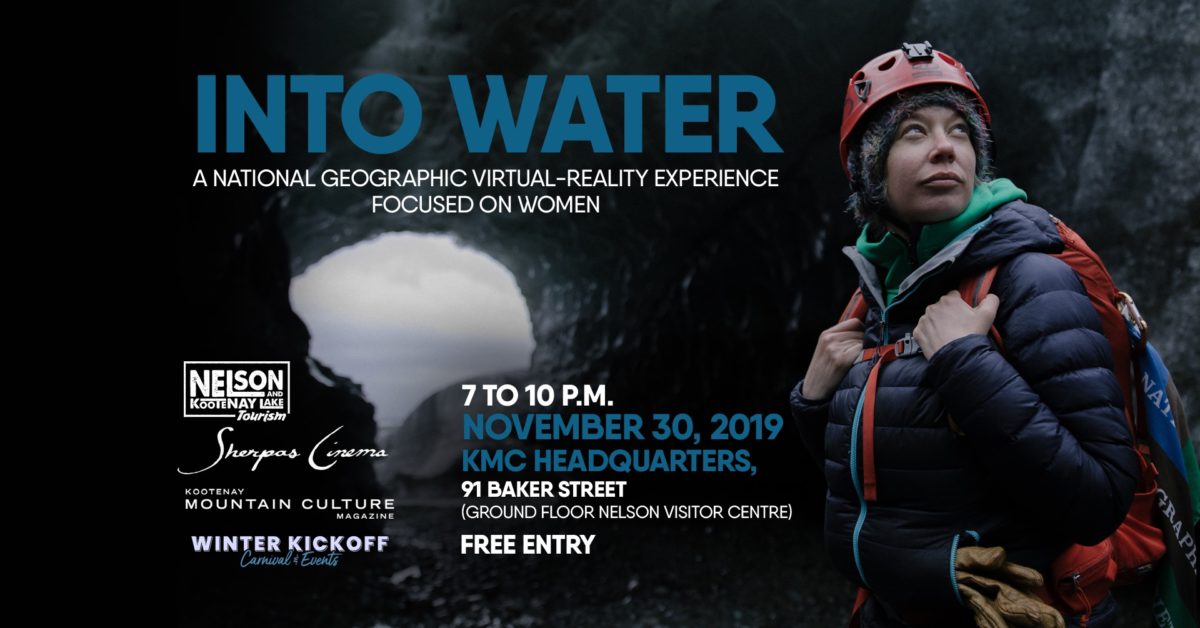
In the first “Into Water” series, we tag along with geographer and glaciologist Dr. M Jackson who has spent the last decade documenting the incredible physical and cultural changes of the Iceland as it experiences an unprecedented melting of its iconic ice. In his Backside column in the latest Coast Mountain Culture magazine, Mitchell Scott writes about his interactions with Dr. Jackson and how she remains so positive in the face of unprecedented change. Below is that column.
Follow the Leader – A CMC Backside Column By Mitchell Scott
DR. M JACKSON has dedicated her life to understanding and protecting ice. She is a geographer, a glaciologist, an explorer with the National Geographic Society, a TED Fellow, and the writer of many books, including my favourite, The Secret Lives of Glaciers. She’s 36 years old, and when she’s not travelling the world studying glaciers, she lives in Eugene, Oregon.
I met Dr. Jackson in Iceland while producing a documentary project for Sherpas Cinema and National Geographic. It’s a place where she has spent a lot of time over the last 10 years. Glaciers in Iceland are melting at an unprecedented rate, faster than at any other time in human history. Locals, guides, and scientists are seeing noticeable changes in weeks and months, as opposed to years. The rate of melt has spawned a boom in visitors to the island nation, much of it driven by what many scientists are calling “last-chance tourism.” According to Dr. Jackson, 25 to 35 per cent of Iceland’s ice will be gone in the next 50 years. If you’ve been there or have seen pictures, it is a hard concept to grasp. Along the country’s southeastern highway, some 30 spectacular outlet glaciers practically burst through your car window. It’s a gorgeous place to visit, even with the rush of people, but in the background there’s a foreboding, pit-of-your-stomach despair knowing an improbable amount of this natural wonder will soon be gone.
Perhaps the most interesting thing Dr. Jackson reveals lies in her perspective. “Glaciers will grow back one day,” she says. “Definitely not in my lifetime, nor my children’s, but hopefully the work I’m doing now will contribute positively to a hundred or so years from now, when glaciers will start to grow again.”
As I follow Dr. Jackson onto the toe of one of these glaciers, I can’t help but be struck by her enthusiasm. She keeps talking about glacier mice, which are these funky moss balls created by incessant wind and tiny bits of dirt. I’m confused. Here’s a woman who has dedicated her life to what feels like the doomed, never-to-return, canary-in-the-coal-mine of climate change. I learn that her life is also interwoven with sorrow: she’s lost both her parents, her brother, and her mentor and boss at the National Geographic Society. But regardless of all that, she has this vibrancy, this fire, rooted by a hope for a better future. “There are 400,000 glaciers and glacierets in the world,” she gushes. “If I can get someone caring about each one of them, I’ve done my job.” But perhaps the most interesting thing Dr. Jackson reveals lies in her perspective. “Glaciers will grow back one day,” she says. “Definitely not in my lifetime, nor my children’s, but hopefully the work I’m doing now will contribute positively to a hundred or so years from now, when glaciers will start to grow again.”
We can be culturally arrogant, often forgetting we are creatures of geologic time. The future is not until we die or until our children do. Dr. Jackson knows this implicitly. It is what keeps her hustling, researching, writing, educating, trying to get people passionate about the marvel of glaciers. To her, they are reflections of ourselves, teaching us to understand nature on its terms, not ours. A place where, as you can see in her cobalt-blue eyes, hope lives eternal.
The “Into Water” virtual-reality experience in Nelson, BC, on November 30 is a part of the Nelson Kootenay Lake Tourism’s Winter Kickoff from November 21 to December 7. Visit winterkickoff.com for more information.
Related Stories
Cool New Video by Nelson BC’s Best Western Hotel
The world of the webisode gets funner by the day. This new piece by the local Nelson family that runs the town's Best…
Arc’teryx Unveils Hut Magic Virtual Reality Experience
Today in Vancouver Arc'teryx, Destination BC and Northern BC Tourism are giving a sneak peak at their new Hut Magic…
Nelson, BC Residents Trying to Stop Cottonwood Logging
Emergency public meeting called in effort to save Nelson’s Cottonwood Slopes from logging. A growing number of…
Garret Buehler Does Nelson Proud
Young gun Garret Buehler gets his shred on in this beauty action/lifestyle/love living and riding in the Kootenays…
Coldsmoke Powder Festival comes to Nelson
The 6th annual Coldsmoke Powder Festival kicks off today, and continues throughout the weekend. Tonight's "Toast to the…
Life Cycles Premiere in Trail and Nelson
Oh great goodness, the wait is going to be worth it. Rossland based filmmakers, Derek Frankowski and Ryan Gibb, coupled…


